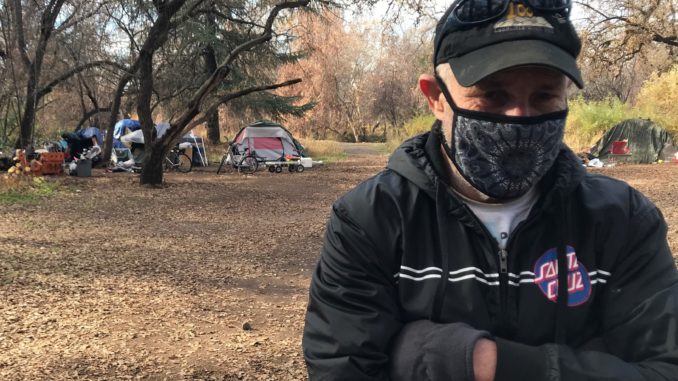
Richie Graves has been worrying a lot lately. He’s worried that, at any moment, Chico police officers or park rangers might appear and evict him and others from the encampment near One-Mile Recreation Area where he’s been living since early March. He’s worried about where he and his friends will end up. And, not least of all, he’s worried about exposure to the coronavirus.
“I know they passed an ordinance, and I understand that,” Graves said Sunday (Dec. 20), regarding the newly seated City Council’s move to elevate park rules—such as camping—to criminal offenses, a stepping stone toward campaign promises made by conservative candidates to break up homeless encampments that have sprung up during the COVID-19 crisis.
Graves, residents of other camps, and volunteer homeless advocates who’ve been visiting the camps regularly for the past two weeks in anticipation of potential camp “sweeps” said they hadn’t heard any verified instances of citations or eviction notices issued yet, but that police and rangers have been visiting some encampments since at least Dec. 14, informing campers of the policy changes and giving vague warnings of eventual enforcement.
“When this virus thing started, they [city officials] said we could stay here to stay safe,” Graves continued. “But now that it’s winter and we’re getting higher and higher [infection] numbers … they want us to move?”
Expressing his frustration that the city has yet to provide shelter or a sanctioned campground—authorized and funded in the Homeless Opportunities Plan passed by the previous council in October—Graves pointed toward a pair of people packing up tarps and tents in the corner of his encampment.
“They’re breaking down and moving,” he said, “but they have no idea where they’re going to go. They’re going to go someplace else [in Chico] where there’s homeless people and the same damned thing is going to happen there. They’ll just keep continually writing tickets and chasing us off until we have some place we can go where it ain’t gonna bother people, but that ain’t going to happen.”
The next day (Dec. 21), the city and True North Housing Alliance announced they were abandoning plans to open a new shelter this winter, giving more gravity to Graves’ statement. Meanwhile, citizens and community groups are standing up against evictions on legal and moral grounds, while tension and fear in the camps runs high.
“Give us an option to go to and we’ll go, gladly,” Graves said. “Most of us don’t want to be out here … we just don’t know where to go, man.”
The waiting game
Judging from internet chatter, people on both sides of the camping issue—those clamoring to clean out the city’s parks and waterways and those who say doing so without providing alternative shelter or camping options is inhumane—expected more immediate and dramatic crackdowns. The City Council green-lighted the park rule changes as an urgency ordinance that took effect the day after the action passed (Dec. 9), prompting online rumors of large-scale “sweeps” of the most populated encampments to circulate, with some incorrectly pinning this past Monday (Dec. 21) as “D-Day.”
As such rumors ricocheted around social media last week, Police Chief Matt Madden and City Manager Mark Orme told the CN&R no such sweeps were planned at that time, saying they were instead focused on education and achieving voluntary compliance.
“It’s not a one-day type of thing,” Orme said last Thursday (Dec. 17). “Every day the circumstances are being worked on. It started immediately [when the ordinance passed]. People are looking for a sudden change, but with law enforcement, it’s one day at a time. There is no big round-up circumstance, but it’s being handled on a case-by-case basis as resources allow.”
Follow-up calls to the Chico Police Department this week for information regarding current or upcoming enforcement efforts were not returned as of publication. Thus far, law enforcement and advocates for the houseless who’ve been monitoring the camps haven’t reported large-scale enforcement actions, though park rangers and members of the CPD’s TARGET Team have continued to visit and inform campers they are breaking the law. Interviewed on Dec. 15, Madden relayed messaging about enforcement similar to Orme’s.
“One of the things we’re doing is outreach, essentially warning folks that this is now law and trying to give them the ability and some time to comply,” Madden said.
Asked specifically about sweeps or large-scale rousting, Madden neither confirmed nor denied either may happen in the future: “We’ll always look for voluntary compliance first,” he said, “and we’re going to be strategic and compassionate about the situation. That’s always our goal before we have to write citations or make arrests.
“But, no matter what, we’re going to enforce the law. There are illegal activities that are not appropriate happening and we’ve had significant problems in these waterways. At some point if we’re not getting that voluntary compliance and continue to see those laws being broken, the police department is going to address those issues.”
Standing up for campers
Several organizations and individuals have spoken out against breaking up the encampments. The Butte County Democratic Party sent a letter to council members last Saturday (Dec. 19) asking they halt evictions to focus on providing a place for campers to relocate, and a representative of Legal Services of Northern California sent a letter to the city Sunday saying that city actions to move campers would be illegal.
“Rather than focus on evidence-based, housing-first solutions that produce positive results for all community members, the City of Chico has enacted ordinances intended to punish people experiencing homelessness,” LSNC Supervising Attorney Cory Turner said via press release. “We call on the City to immediately commit to not enforcing these ordinances as its actions are unconstitutional and will endanger community members.”
The letter cites Martin v. City of Boise and Blake v. City of Grants Pass, recent federal court cases that upheld the right for unhoused individuals to sleep outdoors in public places if no alternatives are provided.
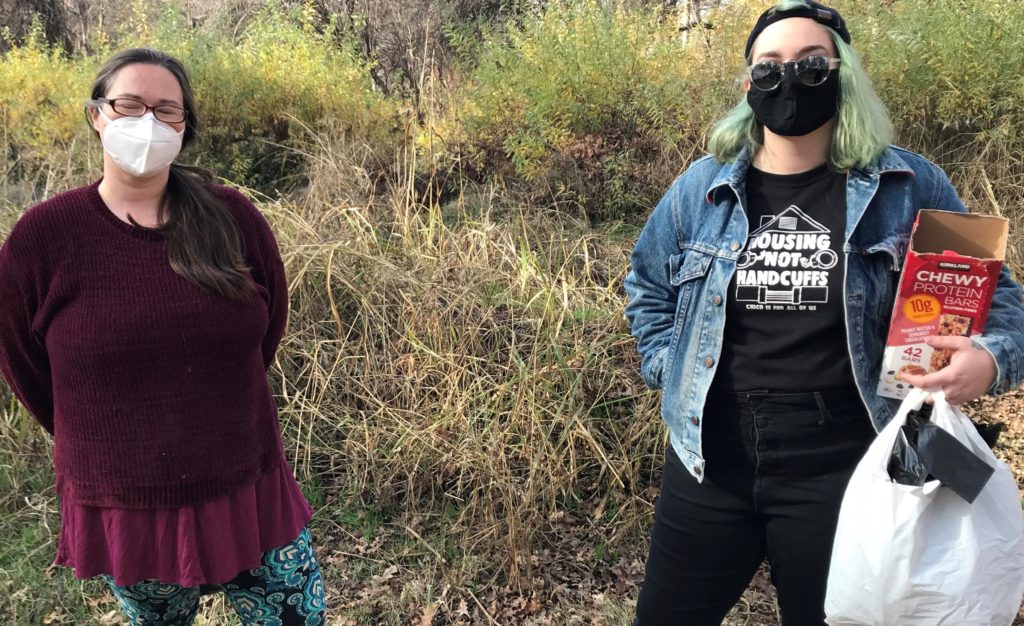
The local chapter of the Democratic Socialists of America, which has been providing cold weather relief mutual aid efforts to the homeless population since early November, released multiple statements via social media challenging the morality and legality of evictions. DSA members have been monitoring enforcement action in the camps, and a number of volunteers and service providers from other organizations have been doing the same on their own accord.
“There’s a bunch of us who don’t want people to get evicted in the dead of winter and to get all their personal belongings destroyed,” said Lauren Kohler, a social worker with Safe Space Winter Shelter currently working with Project Roomkey, who has been to several several camps over the last two weeks. On Sunday, Kohler and two other volunteers visited encampments near One-Mile Recreation Area to hand out snacks and fliers and to speak with campers about enforcement efforts. The fliers included phone numbers for LSNC, service providers and city staff, plus a reference to Martin v. City of Boise.
Kohler, who ran for council this year in District 5, said she feels the new City Council’s direction on campers is “unimaginably cruel.”
Regarding people’s belongings getting destroyed, Kohler said she and several other advocates showed up to Triangle Park last Thursday when they were alerted to city workers clearing trash, fearing sweeps had begun. It turns out the workers had come only to clean up one particularly messy campsite. In doing so, they sent someone’s tent, sleeping bag and diabetes testing kit to the dump.
“To the ranger’s credit, he immediately replaced the medical supplies and sleeping bag, and I got [the camper] a tent,” Kohler said. “But that happens … if you don’t live there, you don’t know what’s trash and what is someone’s belongings.”
When asked about criticisms regarding moving camps during the holidays, during the coldest part of the year and during a pandemic, Orme said, “Whether it’s now or any time of year, people need help, they need that balance of compassion and accountability. The city’s responsibility is to ensure that accountability. The City Council made it very clear there are rules that need to be followed, so it’s our job and obligation as city staff to fulfill that responsibility.”
Orme said the compassion aspect lies in the fact that “the new council has continued to say, ‘We’re ready and willing to authorize you as city manager to authorize any means to get a shelter up.’”
Those ongoing efforts took another hit this week, however, when True North Housing Alliance announced via press release that it will no longer pursue opening a new navigation center/shelter, citing concerns over the health dangers of congregate sheltering as COVID-19 continues to spread.
The city of Chico, which had partnered with True North in that effort, put out a press release the same day saying that due to the nonprofit’s decision it would instead focus on establishing a sanctioned campground at the Silver Dollar BMX site, a plan the previous council nixed due to the projected $600,000 cost involved in helping the property’s current tenants relocate.

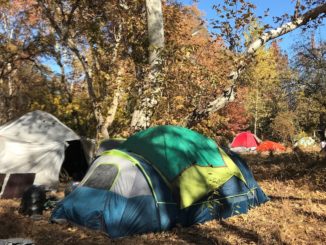
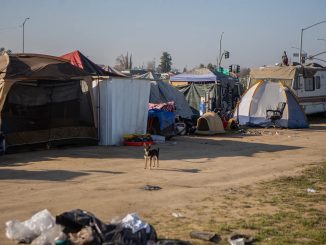
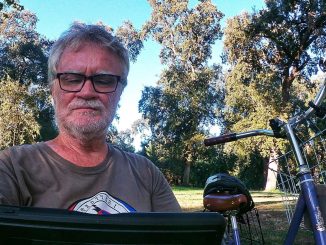
Be the first to comment